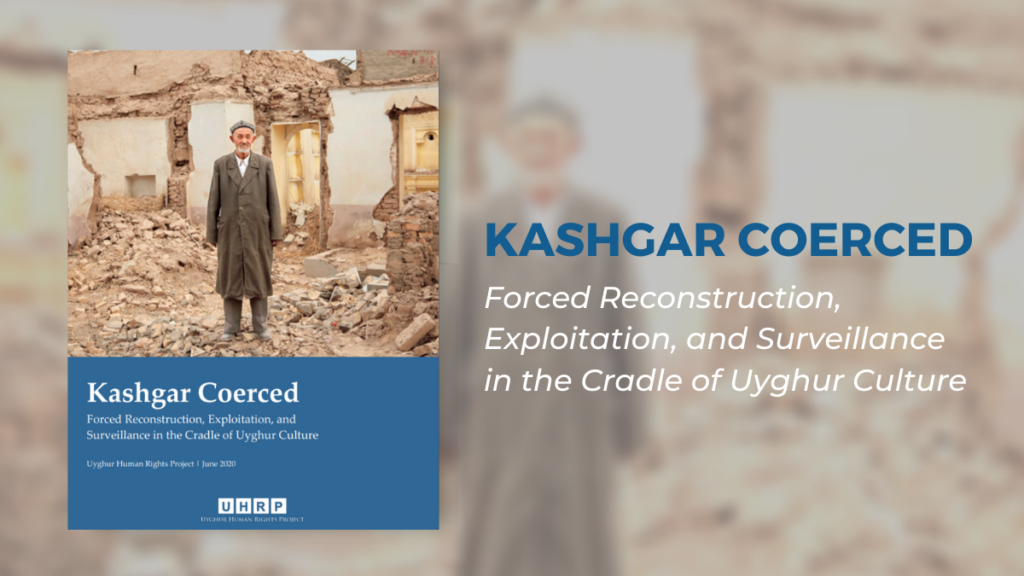Kashgar Coerced: Forced Reconstruction, Exploitation, and Surveillance in the Cradle of Uyghur Culture

For immediate release
June 3, 2020 10:00 am EDT
Contact: Uyghur Human Rights Project (UHRP) +1 (202) 790-1795, (703) 217-7266
The Uyghur Human Rights Project (UHRP) has released a new report, Kashgar Coerced: Forced Reconstruction, Exploitation, and Surveillance in the Cradle of Uyghur Culture. The report documents the Chinese government’s campaign to stamp out tangible aspects of Uyghur culture, using the ancient city of Kashgar as the most emblematic case.
On the one hand, Kashgar is regarded as the “cradle of Uyghur culture,” lying on the ancient Silk Road route, with significant historical importance as a crossroads between empires and civilizations. On the other hand, Kashgar has been at the front lines of the most aggressive, high-tech surveillance campaign of the 21st century. It is the target of a vast and totalizing anti-historical “modernizing” reconstruction project.
UHRP Executive Director Omer Kanat said of the report: “It is difficult to overstate the importance of Kashgar for the Uyghur people. It has been horrifying to watch the city being decimated. Even worse, it is a deliberate government policy. Kashgar was the living heart of our culture. It is not something that we can get back.”
The Chinese government announced its intention in 2009 to raze up to 85 percent of Old City, unique for its centuries-old, interwoven, fractal mud-brick buildings. In response, a host of international organizations voiced their grave concern at the potential loss of priceless architectural heritage, including UNESCO, the European Parliament, Saving Antiquities for Everyone, and the Global Heritage Network. Large-scale demolitions went ahead nonetheless.
UHRP’s report finds that it is precisely because of Kashgar’s uniqueness and its profound degree of cultural significance for Uyghurs that the Chinese government has gone to extraordinary lengths to co-opt the city’s symbolic heritage. Kashgar’s reconstruction, exploitation, and surveillance have been mutually reinforcing, producing a new breed of totalitarian “smart city” optimized for ethnic repression.
The current use of mass internment camps and forced labor build upon longer histories of forced reconstruction, economic exploitation, and surveillance that have been systematically reshaping the city since the early 2000s. Through such an unprecedented urban experiment conducted in the heart of Uyghur culture, the Chinese government has been able to impose its own coerced version of Uyghur society in the service of cultural genocide.
In this sense, Kashgar can act as a prism through which to better understand current forms of Chinese government control over the Uyghur population and its unprecedented campaign of forced assimilation.
UHRP makes the following recommendations to the Chinese government and the international community:
To the Chinese government:
- Immediately cease all demolitions of Uyghur neighborhoods and cultural sites across East Turkistan until a transparent process of genuine consultation has been undertaken with local residents.
- Immediately cease the destruction of all sites of cultural value to the Uyghur people, including mosques, shrines, graveyards, and other sites.
- Implement Article 2 of the Declaration on the Right to Development that establishes “active, free and meaningful participation in development.”
- Abide by domestic legal instruments that protect Uyghurs from arbitrary state interference, such as the Regional Ethnic Autonomy Law, the Property Rights Law (Article 42), and the Regulation on the Protection of Famous Historical and Cultural Cities, Towns and Villages (Article 28).
- The State Administration of Cultural Heritage and the National Commission of the People’s Republic of China for UNESCO should add Kashgar’s Old City to UNESCO’s Tentative List for consideration as a World Heritage Site.
- Shut down the Integrated Joint Operations Platform (IJOP) in the Uyghur region, delete all data collected, and suspend the collection and use of biometrics until the introduction of a comprehensive national law to protect privacy rights.
To the international community:
- The UN Special Rapporteur in the field of cultural rights should transmit information concerning the destruction of Kashgar’s Old City as well as cultural sites across the Uyghur region to the Chinese government for immediate response.
- UNESCO should take immediate steps to engage with the Chinese government in relation to the current status of Kashgar’s Old Town, make recommendations, and develop a collaborative Conservation Management Plan for the site.
- The European Parliament should follow-up on its March 2011 resolution calling on China to end forced resettlement of Uyghurs in Kashgar to declare its concern for continued destruction of cultural sites across the Uyghur region.
- In bilateral and multilateral exchanges, governments should raise private and public concern for the purposeful destruction of tangible cultural heritage of the Uyghur community.
- Impose targeted sanctions, such as the US Global Magnitsky Act, including visa bans and asset freezes, against Party Secretary Chen Quanguo and senior officials responsible for abuses.
- Impose export controls to deny the Chinese government, and companies enabling government abuses, access to technologies used to violate basic rights.
